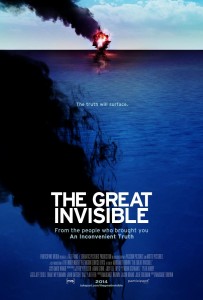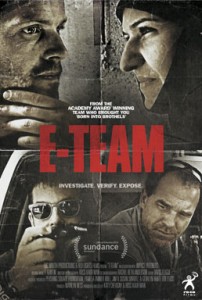 At SXSW 2014, Tilda Swinton told a packed crowd that film was an”amazingly humane opportunity to put yourselves in the shoes of someone else.” Verite documentaries exemplified the best in that opportunity.
At SXSW 2014, Tilda Swinton told a packed crowd that film was an”amazingly humane opportunity to put yourselves in the shoes of someone else.” Verite documentaries exemplified the best in that opportunity.
THE GREAT INVISIBLE
The grand jury prize winner, “The Great Invisible,” was a great example. Margaret Brown’s film invites us to look at the consequences of the BP oil spill on the people most directly affected–the victims of the Deep Water Horizon explosion and their families, the seafood industry workers, and oil industry executives.
But this is not an expose. Rather, with a combination of interviews based on months of conversation and verite footage, it invites us into the experience of these three groups. The victims and their families live with PTSD; the seafood workers, never well off, are destitute and often unable even to claim benefits owed them for lack of paperwork; the oil executives know about bad decisions made for bad reasons, and know nothing will change. The human cost of offshore oil is terribly high, but not yet, it appears, high enough to make us confront one countervailing fact: we Americans love our cheap oil. And, as executives explain at the end of the film, so long as we want that more than, say, worker safety, environmental health, community businesses, or industrial innovation, we will keep getting cheap oil. “So it’s just about how do you want your poison? What’s your cost calculation?” says one.
When does the human conscience and quality of life begin to tip the balance against cheap gas, cheap electricity, cheap heating oil? The film is designed to spur that question. As one of the film’s central characters says as he explains why he volunteers at a free food bank for destitute seafood industry workers, “You don’t have to get paid for everything you do. Let something be a blessing. If you don’t have time to give a blessing, you’re a mighty poor man.” And as the father of a worker killed in the Deep Water Horizon explosion says, on his way to a public hearing to hear from the company that never apologized to him, “Somebody ought to feel something…besides greed.”
“The Great Invisible” will be out in theaters in the fall, with help from Participant Productions. Backed originally by ITVS, it’ll then be on public TV, and Pivot, Participant’s TV channel. Participant also is working on a fiction film based on the doc’s story. “I hope seeing people’s lives and the deep connection we have with this industry, we can get a little curious about how we can change our behavior,” Brown said.
E-TEAM
 Other work that let viewers walk in the shoes of another was Katy Chevigny and Ross Kauffman’s E-Team. The film gives an extraordinarily intimate view of the work of Human Rights Watch’s emergency team—the people who jump right into an ongoing situation to document human rights violations. The film follows four people, but the center of the story is Russian émigré Anna Neistat, who can be alternately passionate, impatient, empathetic, and coldly precise. It follows them as they investigate human rights violations in, among other places, Syria and Libya. We travel along as they get smuggled into Syria, and follow the blooming love-and-marriage story between Neistat and fellow e-team member Ole Solvaag. The film deconstructs cynicism about human rights work, not only with its portrayal of dedicated people who shrug off any heroic labels, not only with the often-horrifying stories that human-rights victims tell the e-team, but also with evidence of the power for change of releasing this information into the world.
Other work that let viewers walk in the shoes of another was Katy Chevigny and Ross Kauffman’s E-Team. The film gives an extraordinarily intimate view of the work of Human Rights Watch’s emergency team—the people who jump right into an ongoing situation to document human rights violations. The film follows four people, but the center of the story is Russian émigré Anna Neistat, who can be alternately passionate, impatient, empathetic, and coldly precise. It follows them as they investigate human rights violations in, among other places, Syria and Libya. We travel along as they get smuggled into Syria, and follow the blooming love-and-marriage story between Neistat and fellow e-team member Ole Solvaag. The film deconstructs cynicism about human rights work, not only with its portrayal of dedicated people who shrug off any heroic labels, not only with the often-horrifying stories that human-rights victims tell the e-team, but also with evidence of the power for change of releasing this information into the world.
Critical to the success of both of these films is an investment in the relationships between filmmakers and subjects; it’s clear in every scene that the subjects have given permission to the filmmakers and, implicitly, us the viewers, to join them in their experience. That’s a privilege we benefit from because the filmmakers earned it.
These films also share another quality: They exercise deep respect both toward their subjects and toward the viewers. The filmmakers have carefully thought about what of the multifarious realities before them are important to show us, given the subjects their dignity, and allowed us to learn from them. That makes both great platforms for future discussions about important topics, across traditional lines of disagreement. They let productive conversations happen.
